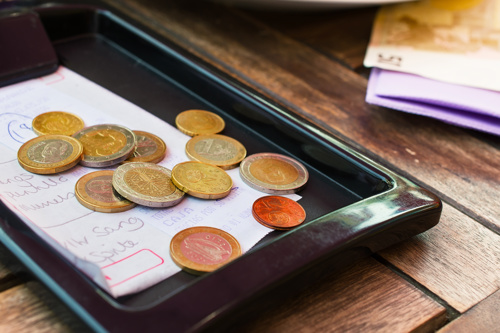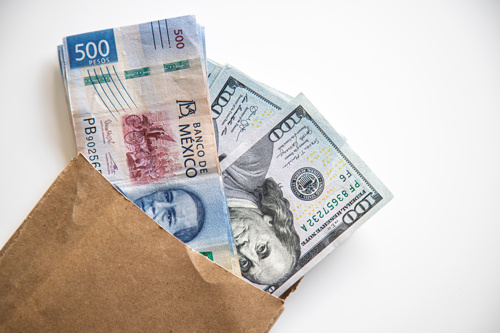When you’re paying for something by credit or debit card overseas, you’ll often be given the option to pay in the local currency – in euros at a tapas restaurant in Spain, for example – or in British pounds. It almost always works out cheapest to pay in the local currency, and that’s because of the exchange rate you’ll pay on each option.
In a nutshell, the rate offered by your card provider when you choose to pay in the local currency will usually be better than the exchange rate offered in pounds by the vendor taking payment abroad. It all comes down to something called dynamic currency conversion, or DCC, which we’ve gone into more detail about below.
On the other hand, paying in the local currency abroad will leave you facing a non-sterling transaction fee with most cards, as well as potentially other card fees, so it can be tricky to know which option to choose. Let’s take a closer look at card fees and exchange rates so you can be aware of pricing when you’re abroad – and enjoy that tapas without worrying about the cost.
Do you get charged for using your card abroad?

Yes, most credit and debit card providers charge a fee for payments made outside of your home country. So unless you’re paying with cash, you can expect to potentially have charges added on. Depending on your card type and issuer, these may include:
Non-sterling transaction fee
Many UK credit and debit card issuers charge an additional non-sterling transaction fee when you use your card on holiday and pay in the local currency. They charge this fee as they need to convert the local currency into pounds sterling.
Remember, this fee applies on every transaction you make in this way. So if you make three separate payments of £100 while you’re in Spain, and your card issuer charges a rate of 3% for example, you’ll be charged £3 on each transaction. Example transactions include:
- Paying for a meal
- Buying souvenirs from a shop
- Buying a glass of wine in a bar
- Paying for extras in your hotel
Cash advance fee
If you use your card to withdraw money from a cash machine while you’re away, there might be a cash advance fee to pay, too. This can be a percentage of the transaction amount or a set fee, so always check with your card issuer before you travel.
Interest charges
If you’re using a credit card, you may also be charged a fee based on your normal interest rate if there’s a balance that isn’t paid off by the end of the month.
Is it better to pay in the local currency then?

While it might sound like it’s better to pay in pounds when you’re abroad to avoid a non-sterling transaction fee, it’s usually still cheaper to pay in the local currency.
That’s because when you choose to pay in the local currency, your card issuer will set the exchange rate. But when you choose pounds, the exchange rate is decided by the retailer or their bank at the point of payment – and it almost always works out to be far less competitive.
This is known as Dynamic Currency Conversion (DCC), and it also means you’ll be given a different rate from one shop or restaurant to the next, as it’s down to the retailer to decide. The same thing happens when you take money out of a cash point abroad and choose to withdraw money in pounds rather than the local currency – you’ll be hit with a less favourable exchange rate.
Consider choosing the local currency in both scenarios to avoid being caught out. And check what currency has been automatically applied when you’re at an ATM screen, or being handed a card machine in a shop or restaurant. It might be that you need to change the currency from pounds to the local currency, and you should always be given the option to.
How can you avoid overpaying on holiday?

There are lots more savvy ways to avoid hefty charges when you’re paying for things on holiday, alongside paying the local currency and being mindful of your bank’s card charges.
Take cash
One way to avoid card fees altogether is to buy your Travel Money before you go away. That way you can secure a good exchange rate back home, pay in cash while you’re abroad, and simply exchange your foreign currency back again after your trip – if you haven’t spent it all, of course. Taking cash also means you’ve got money ready for tipping, and as payment if you find yourself somewhere that doesn’t accept card. Our guide to travelling with cash has some useful info on this.
Use travel debit and credit cards
Some providers offer debit cards specifically for travel, with no added charges when you’re away. If you shop around you may also find a credit card that won’t charge a cash advance or non-sterling transaction fee – just bear in mind any interest that you might be charged.
Get a prepaid currency card
A prepaid currency card is similar to a gift card that you load up with foreign currency before you go. Multi-currency prepaid cards allow you to load multiple foreign currencies onto one card, so they can be a good option if you’re visiting more than one destination and want to have a set amount of money available for each one. Sterling prepaid cards allow you to load your card with pounds and spend in multiple currencies, so they offer more flexibility over how much of your money you spend in each currency.
Just keep in mind that prepaid cards are not protected by the FSCS (Financial Services Compensation Scheme). The FSCS protects customers’ money when a bank, building society or credit union goes into administration, guaranteeing up to £85,000 (or up to £170,000 for joint accounts).
Check your bank terms beforehand
As always, knowledge is power – so always check your individual card issuer’s charges before you travel. That way you know what fees you’re looking at when making payments abroad, and can choose the most money-savvy option.
Buying Travel Money with M&S Travel Money
Wherever you’re heading to, it’s always a good idea to carry at least some cash in your local currency. Order your Travel Money with M&S online today for Click & Collect with no commission and no hidden fees. T&Cs apply.
